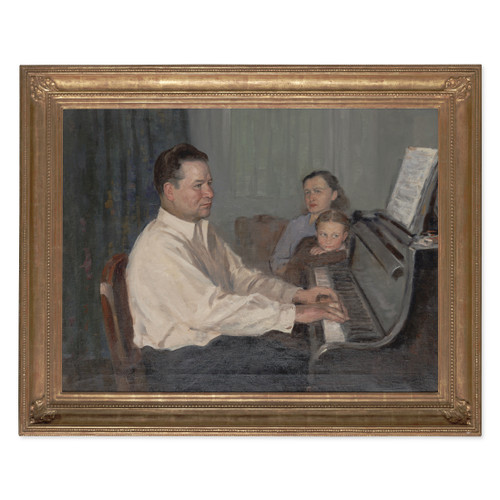Original oil painting by Nikolai Gladkov.
The piece measures 41" x 36" overall.
Signed and dated on the back.
Closed corner, gilded frame handcrafted by Richard Tobey.
This painting comes from our collection of original Soviet-era oil paintings.
The history of Russian Impressionist painting is the tale of an extraordinary movement in the art of the twentieth century. The concept of "Soviet Social Realism," a.k.a. Russian impressionism, emphasized the social role of art; it insisted on the superiority of content over form and required a wholesale return to traditional skills, regarding history and European art from the Renaissance as a living source of inspiration.
In the ensuing years, artists struggled between their duty to reflect the ideals of the State and developing their own stylistic repertoire as party leaders demanded that art should be "understood" by the average person. Somehow, Russian artists managed to perform a delicate balancing act between the requirements of "accepted" working class art by painting poetic scenes in which the worker, farmer, or monumental Russian industry are the primary subjects.
With the death of Stalin in 1953, the darker academic pallet began to lighten and the need to conform to rigid subjects eased. This was the beginning of what is known as the "Severe Style" of Social Realism. The fall of the Soviet Empire took with it the last of the social realist art form. By 1990, all that was left of Russian Impressionism was a body of work created in the five previous decades by a few masters and their progeny.
About Nikolai Gladkov:
Nikolai Aleksandrovich Gladkov was born in Slava (a province of Omsk) in western Siberia in 1924. His early studies were at the Sverdlovosk Art College from 1945 to 1950, followed by the famous Repin Institute from 1952 to 1958. Gladkov was active in Gorky and began exhibiting his work in 1961. He also taught at the Gorky Art College in the late 50s into the early 60s. Gladkov specialized in creating portraits.








